Bhāsa’s plays contain quite a number of novel and fresh ideas and emotions. He also brings in proverbial statements through the dialogues of the characters; they inclusion bolsters the overall aesthetic experience. The following are examples from the Yajña-phala,
Author:hari
चन्द्रगुप्त विक्रमादित्य ने जो भी निर्णय लिए तथा जो भी संबंध स्थापित किये थे वे सब शास्त्रानुसार तथा परम्परानुगत प्रथा द्वारा मान्य थे। उसके शासन काल में सनातन धर्म का उत्थान अपने चरम शिखर पर था जिसकी कोई तुलना नही की जा सकती है। उसके शासन काल में विभिन्न वर्णों के मध्य सामंजस्य के अनेक उदाहरण है। के.एम.मुंशी कहते हैं –
A similar example can be seen even in business : (1) Adhiṣṭhāna = Capital and site of business (2) Kartā: the businessman’s and his knack (3) Karaṇa: the stock and instruments of measuring weights and lengths (4) Ceṣtāḥ - advertising and other means of attracting buyers (5) Daiva - customers liking a product or otherwise.
Sonnavadi is a small village. It might have originally been called Svarṇavāḍi. Head of that village was a man called Sonnegowda. People often talked about Bhissegowda being one of his ancestors. Bhissegowda was a pāḻegāra (i.e. chieftain).
Around that time, Sonnegowda was an affluent farmer. Though he never was a pāḻegāra officially, his behaviour was typical of one.
We don’t know if there are more plays written by Bhāsa. We have been able to find fourteen now. Many compendiums of poems quote quite a few verses that are supposedly penned by Bhāsa; however, they don’t appear as a part of the fourteen plays we have discussed so far. It is, therefore, possible that he had authored a few more plays and such verses were part of those. Even if it turns out that he had authored only these fourteen plays, it is quite a landmark in the history of Sanskrit literature; we say this because no other poet has single-handedly penned these many plays.
अपने छोटे भाई की सफलता के कारण रामगुप्त में ईर्ष्याभाव बढ़ने लगता है और वह अपने भाई को विभिन्न तरीकों से क्रूरता पूर्ण व्यवहार करता है। उसने अपने भाई की हत्या करने का षडयंत्र भी किया। एक रात अंधकार में छिपकर जब उसने चन्द्रगुप्त विक्रमादित्य पर आक्रमण किया तो चन्द्रगुप्त विक्रमादित्य ने जिसे आक्रमणकर्त्ता की पहचान न होने से, पलटवार करते हुए रामगुप्त को मार डाला। बाद में उसने ध्रुवदेवी से विवाह कर सिंहासनासीन हो गया। यही सार संक्षेप में देवीचन्द्रगुप्त नाटक की कहानी है[1]।
There are two opposite energies hidden in music. One excites, inflames, and disturbs the mind. The other steadies it and calms it down. One helps in concentrating, the other perplexes the mind. One is for dhyāna, the other is for play.
4.5. Dhvani
As a devout follower of Ānandavardhana, Sāyaṇācārya accepts three śabda-vṛttis: abhidhā, lakṣaṇā and vyañjanā. He does not admit tātparya:
The nature of Duryodhana in Ūru-bhaṅga is different from the manner in which he is portrayed in the plays Dūta-vākya and Dūta-ghaṭotkaca. In the segment of the story captured in the Ūru-bhaṅga, we see that Duryodhana has realised his mistake and is at peace. Balarāma appears there when the gadā-yuddha, i.e., fight with mace is about to begin. He looks at Duryodhana and laments, “You have been cheated by Bhīma!” Duryodhana does not agree with his words. He says, “I feel as though Hari entered Bhīma’s mace and brought death upon me.”









